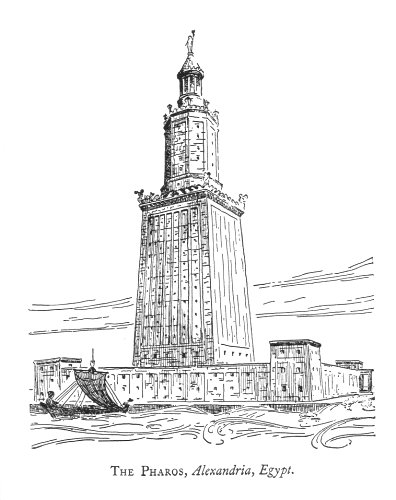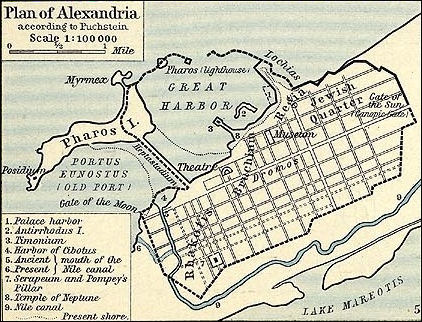Announcements
Welcome to Ancient Studies 401!
- If you have any questions about the content or the assignments, please send an owl to either myself or my PAs. You can also write on my profile. Whatever works best for you.
- If you wish to appeal a grade you received, please send me an owl with your grade id so I can have a look and best advise you. If you are unsure where to find your grade id, I can help with that too.
- I will try to have all assignments graded and returned to you no later than a week after submission. Please do not ask for grading updates before then.
- If you see any mistakes, typos or anything like that while you take this class, please let me know so I can fix them.
- You can find my office in the following HiH group: Click here to access Professor Salvatrix's Office. Feel free to join and engage in discussions and various activities related to the ancient world and beyond.
Lesson 4) The Light of Alexandria

Oftentimes, when we look at the achievements of the past, we do so through a lens of comparison, typically thinking to ourselves that a part accomplishment was “impressive for its time.” However, today, prepare to be impressed entirely on merit! We will be looking at the very tail end of the ancient Egyptian empire to see what they had accomplished by the end of it. Though, truly, we won’t have the time or patience to list every individual achievement, we will at least go over quite a few of the most astounding. In doing so, we will cover one of the most famed libraries near and dear to many a bookish heart: the Library of Alexandria.
A Light in the Darkness
As we may already know, ancient Egypt remained a relatively stable and constant presence for well over 2,000 years - significantly longer than most other civilizations. The pure volume of knowledge and experience that was amassed during this time lent itself to the creation of a great storehouse of information and education. While it took most of the civilization’s lifespan to materialize, the great city of Alexandria became a beacon of sorts for all sorts of knowledge in the twilight years of the ancient world. That beacon was physically represented by, of course, the library at Alexandria, but also the great Lighthouse of Alexandria, one of the Seven Wonders of the Ancient World.
Founded by Alexander the Great in 331 BCE, Alexandria became the largest and most prosperous city in the world at its peak. For 600 years, it reigned as an unofficial capital of the wizarding world, as many great witches and wizards converged there to collaborate, experiment, and record their exponentially growing knowledge of the world. Great advancements were made in magical fields such as charms, divination, and potions during this era. However, it was not just magical knowledge that improved.
As we covered in previous lessons, the delineation between magical and Muggle was very difficult to spot in ancient times, particularly in ancient Egyptian society. As such, many of the scholars at Alexandria made strides in both areas, often simultaneously. Moreover, some Muggle inventors hypothesized about magical practices and theories while magical persons made great strides in math or art. It would have been quite difficult at the time to discern who was a magic user and who was not… and it is even more difficult now that the ravages of time have hidden the truth of things.
So, in the next section here, when I name a famous inventor, you will notice I make no mention of their affiliation with magic, as in many cases, it is impossible to know for sure whether they were magical or not! There is reason to believe that many of these inventions may have been done with the help of magic, but the truth is lost to the sands of time. Therefore, I will merely list their inventions and, if possible, a bit of background.
Kicking it all off, we have Eratosthenes (c. 276-194 BCE) who calculated the circumference of the Earth to within 80 kilometers (50 miles) of its actual size. This feat was doubly incredible as most at the time still believed that the Earth was flat! There was also the aptly named “Hero” of Alexandria, also called “Heron,” who was born and raised in the city (c. 10-70 BCE). This inventor created a great host of things, but is most famous for the windwheel, which harnessed wind energy, the aeolipile (a type of steam-powered engine), the vending machine, as well as a mathematical formula known as “Heron’s Formula.” But Hero wasn’t the only mathematical contributor. Euclid, the great mathematician and “father of geometry”, taught at the University of Alexandria circa 300 BCE, as did the great engineer and mathematician Archimedes (c. 287 to 212 BCE). The ancient Greek poet Callimachus also contributed with an addition very near and dear to my heart: the first library catalog. I could go on for hours about the many inventions and discoveries of Alexandria, but that would take more time than we have! Let me briefly sum up the scale of the knowledge contained therein instead.
Much of this collaborative learning took place in the University and the Temple of Serapis, which were part of the legendary Library of Alexandria. The library began construction under Ptolemy I (c. 323 to 283 BCE) and was completed under Ptolemy II (c. 285 to 246 BCE). Once completed, the library had room for 70,000 papyrus scrolls, and at one time housed over 500,000 books. A great number of these scrolls and books were records of magical spells and discoveries made by the Egyptian scholars, as well as notes on magic that they learned from witches and wizards visiting from other civilizations.
And All Will Turn To Silver Glass…
As you could imagine, during the city’s golden years, magical knowledge and families thrived. Knowledge was passed down from fathers to sons, and mothers to daughters. Alas, as is often the case, the glory of the city did not last. During the last 300 years of its life, the library was subject to several incidents that ultimately led to its destruction.

Things began to slowly unravel in 145 BCE, during the reign of Ptolemy VIII Physcon, who attacked and killed many intellectuals in the city in an attempt to take control of it, an act from which it never truly recovered. However, things were not helped in 48 BCE when Julius Caesar set fire to the port of Alexandria as a tactic in winning the civil war of the time. The fire spread to many buildings immediately adjacent to the port, including the library. Thankfully, the witches and wizards in residence at the time quickly worked to subdue the flames, and the damage to the building’s contents was minor.
At this time, one of the members of the elder witches and wizards of the time, an unidentified master in divination, foretold the destruction of the library. Coupled with the close call of the fire, the elders then felt it best to move the magical collection of books and scrolls from the library proper to the Serapeum, which was further inland.
This prescient decision managed to save the bulk of magical knowledge for a time, as in approximately 270 to 275 CE the library was significantly damaged. During this time, the current Roman emperor Aurelian (aka Lucius Domitius Aurelianus Augustus) was suppressing a local revolt, and the library was the most prominent casualty. While the walls still stood, the contents were heavily damaged, and much of the knowledge still held in Alexandria was lost.
And still the destruction was not yet complete. One of the greatest tragedies in our history, perhaps second only to the Inquisitorial period, was the decree outlawing paganism in Alexandria by Theodosius I in the later half of the 4th century CE. With this decree, the demise of the greatest repository of knowledge that the world had yet seen was certain. Pagan temples, and any other buildings that were even accused of being associated with paganism, were razed to the ground.
So suddenly did this religious turmoil hit the city that our wizarding ancestors were unable to save much of the knowledge that was contained in the Serapeum. The students and professors who were in the building at the time grabbed whatever manuscripts they could hold onto and apparated out of the city. Sadly, many great works of magic, most notably charms work, were lost.
Centuries later, even our greatest minds have not been able to recreate some of the magnificent feats of magic that were commonplace in ancient Egyptian society. Though, thankfully, our charms work has improved dramatically in terms of protecting our current level of knowledge! You will find that our great libraries, including the one here at Hogwarts, are well secured from damage and destruction regardless of whether or not a wizard is within the library when it is attacked.
Closing
And that ends our discussion for today! Next week we will enjoy our first hands-on assignment of the year, namely learning some of the specific spells that were employed by the ancient Egyptians. You will also learn a little bit more about what being a curse-breaker is all about from a very special guest lecturer - Professor Penrose!
Your assignment for today is your midterm! As this is a very important test that I expect you have studied for, you will not be allowed to retake it or appeal questions on it. That said, please do not panic! It is not my intention to trick you or make the midterm horrifically challenging. Any student who reviews their notes and their previous assignments and quizzes will do just fine.
As always, please let me know if you have any questions or concerns before submitting your work, and enjoy the rest of your day!
Image credits here, here, and here
Original lesson written by Professor Liria Morgan
Enroll


